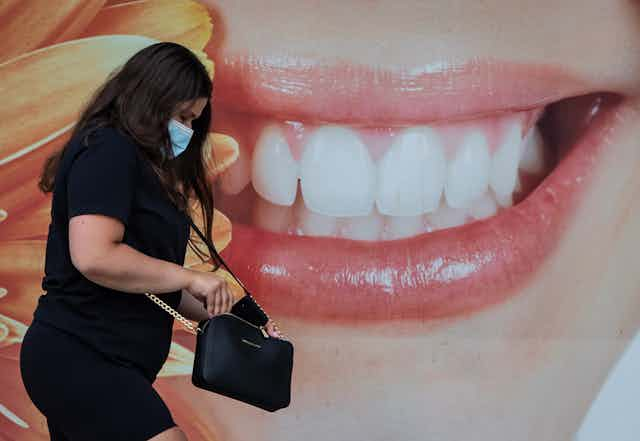The COVID-19 pandemic has raised Canadians’ anxiety levels: anxiety about contracting the virus, financial hardship and isolation. But one thing Canadians don’t have to worry about is how they’ll pay for essential health care if they need it. For that, at least, all we need is our health card.
Actually, that last part is only partially true. Vital areas of health care were excluded from medicare, our universal health-care system. And for many Canadians, access to these health services has worsened since the start of the pandemic. Many have lost their jobs, and with that, essential health benefits like dental care.
The COVID-19 pandemic has reinforced just how foundational medicare is. As we recover from the effects of the pandemic, we must strengthen that foundation. It’s time for Canadians to start using their health card, not their credit card, to access dental care.
Health and oral health
Dental care is not luxury. Oral health is a critical part of overall health. Dentists and emergency physicians see the consequences of poor oral health on a daily basis.
Poor oral health can cause or worsen other medical conditions due to chronic inflammation. Providing dental care improves diabetic control, reduces the risk of aspiration pneumonia in long-term care homes, improves completion of treatment for substance use disorder and increases drug abstinence.
It has even been shown to increase employability. It’s hard to confidently interview for a job if you’re afraid to smile.

One in three Canadians lack dental insurance and one in five avoid seeing a dentist each year due to cost. In terms of dental care, our “universal” health-care system is anything but. Of all dental care spending, only five per cent is public. That’s less than the United States, where 10 per cent of dental care spending is public, and not even close to the United Kingdom, where it is 46 per cent.
This already dire situation was worsening before the pandemic, with more seniors retiring and losing their work-related benefits and more people working in the precarious gig economy. COVID-19 has only exacerbated this.
If Canada’s health-care system were a mouth, it would be too embarrassed to smile for fear of showing the large gap that is our missing dental care system.
The cost of forgoing dental care
Many Canadians forgo routine care because they can’t afford it, leaving small problems to fester and grow. Our current system not only stresses our individual wallets, it also puts additional strain on our health-care system.
With four in 10 low-income Canadians avoiding seeing a dentist due to cost, many end up relying on our emergency departments. Every nine minutes in Ontario, someone visits an emergency department for dental pain, when they really need to see a dental professional. The cost of these visits across the country is estimated to be more than $150 million a year.
The Canada Health Act makes the objective of Canadian health-care policy very clear:
“to protect, promote and restore the physical and mental well-being of residents of Canada and to facilitate reasonable access to health services without financial or other barriers.”
Given this, we must guarantee access to essential dental care for every Canadian.
Expanding public spending to guarantee dental insurance for all would help Canadians access routine care, reducing the need for more costly and complex procedures later. This would benefit individuals, reduce costs for employers and give businesses a competitive advantage similar to the way medicare does now.
Challenges beyond public financing
While public financing is important, it doesn’t guarantee access to a provider. The private delivery model has left many poor and rural communities significantly under-resourced. Public delivery of some dental care can ensure that people actually have a provider near their community.

Many dentists in private practice have historically been hostile to universal dental care and public delivery. That’s no surprise because it cuts into their monopoly on care.
Doctors were once the same too. Doctors were the biggest opponents of medicare when it was first introduced in Saskatchewan. On July 1, 1962, the day medicare was born, most of the province’s doctors went on strike. But now, very few would want an American-style health-care system like we currently have for dental care — especially during the pandemic.
The COVID-19 pandemic hasn’t given Canadians many reasons to smile. Investing in a universal, publicly-funded dental care system would ensure that a healthy, pain-free smile is in sight for every Canadian.
This article was co-authored by Brandon Doucet, a dentist practising in Newfoundland with interests in surgery and public health and the founder of Coalition for Dentalcare.

